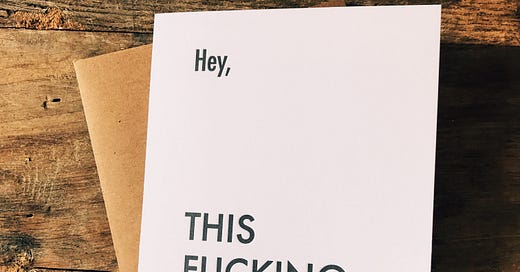Welcome to the “Hello, From the Other Side” series, a (non)advice column from someone who's been there and (currently) lives to tell the story. This is one person’s perspective to help shed light on the grief experience and to help others feel less alone.
Please note that I am not a therapist. I don’t have any official expertise, but I do have experience. Lots and lots of experience.
Q: The holiday season is in full swing, which means I am running into old classmates and acquaintances — a few of whom have experienced a recent loss. I’ve read about what not to say, but I’m finding it hard to figure out what to say. I’m learning it’s best to acknowledge the loss, but I feel so awkward bringing it up! I’d love some concrete examples of what I should say. — At a Loss for Words
Hello, At a Loss -
Whenever I get questions like this, I tread lightly. There are so many “shoulds” in the world, that I hesitate to tell anyone what they should or should not say, or should or should not do (as my therapist once said, “stop ‘shoulding’ all over yourself”). Grief is personal and unique to each of us, which means what feels supportive to one person may feel harmful to another.
Tending to another person’s grief is a lot like spaghetti — you throw it at the wall and see what sticks.
It’s messy — and what sticks one day might not stick the next.
Because of this, I’ve asked my Instagram community of thousands of grievers this very same question: what is actually helpful to say? Below are 20 responses that they feel are supportive.
But in re-reading the above, most of the responses felt too…personal. You didn’t ask what to say to your grieving best friend; you asked what to say to old classmates and acquaintances. And in my opinion, that elicits a very different response.
I remember my first holiday season back “home” after Brad died — the awkward feeling of running into old friends in a crowded bar, and the massive elephant of Brad’s death sitting between our pints of beer.
If Helen from high school homeroom had instructed me to “be gentle with myself” or had asked about my grief experience, I would have fought the urge to throw my overpriced drink in her face. And I certainly didn’t want her coming over to my house to “sit in my pain with me.” Unless Helen had been through her own life-altering loss, I didn’t need to connect with her over that pain.
All I needed was for my pain to be acknowledged.
(This is different from what I wanted from close friends and family members — then I wanted my pain to be acknowledged, understood, witnessed, tended to, and given space.)
Even more, with old friends and acquaintances, I wanted my loss to be acknowledged in a way that allowed me to control the narrative.
I wanted you to crack open the window just enough to let the gentle breeze of grief in, and give me the ownership to either open the window all the way or shut it completely.
I wanted my grief to be acknowledged, but I also wanted the space to shift the focus and the choice to not dwell on it.
But how do you do that? How do you acknowledge a loss and still give ownership to the griever?
Here are a few options you can throw at the wall:
“I’m so sorry to hear about [insert name here]. I’d love to hear more about them if you’re up for sharing a story — and I completely understand if you’d rather not right now.”
“I imagine it’s hard to here without [insert name]. Can I be your wingman for the night so you don’t have to handle the awkward conversations alone?”
“I remember a time when [insert short, personal memory about them]. They were really [wonderful/funny/bold/etc.].”
My (non)advice is to keep it brief and light — especially if you’re in a public space with lots of people. The goal is to open the window for them and give them the choice to continue talking or to re-direct.
If they choose to open up, be an active listener, be curious, and take your cues from them.
And then, come back and let us know what stuck.
Have a question for a future column? Ask it here.
If you found this helpful, here are similar posts that may be useful:









“I was so sorry to hear that( person) died.” That’s enough. Just acknowledging that it happened and saying their name means so much
The card is exactly how I'd describe losing Oscar to anyone who asked... It's just shitty... mic drop.